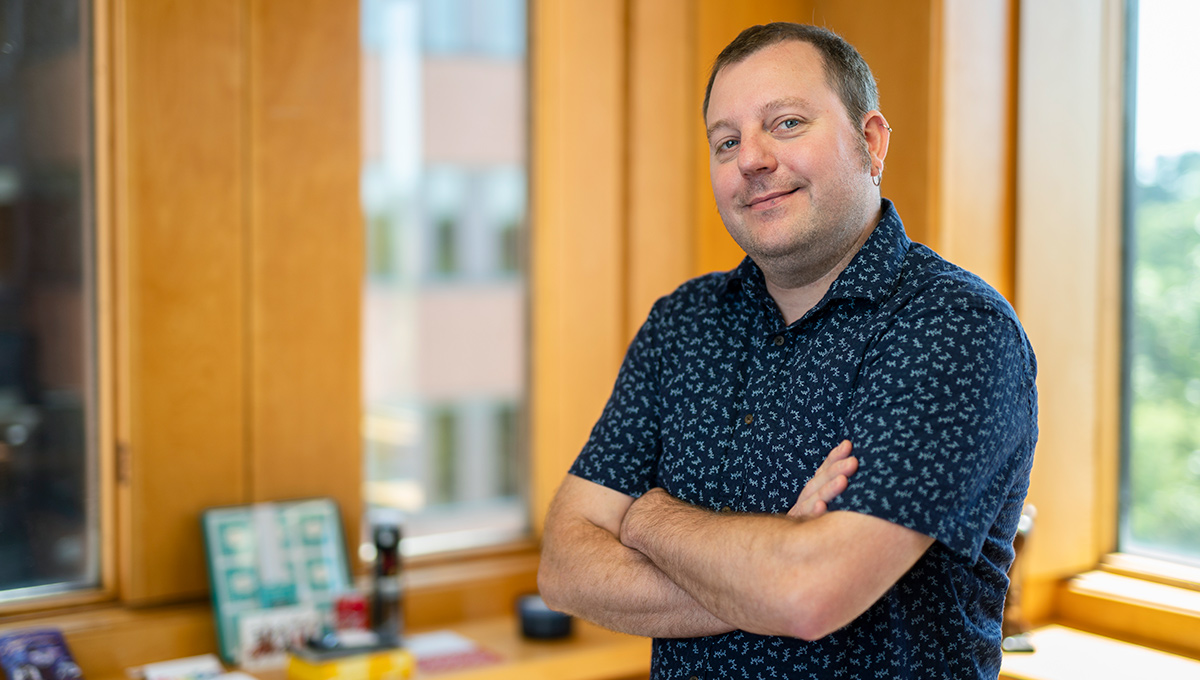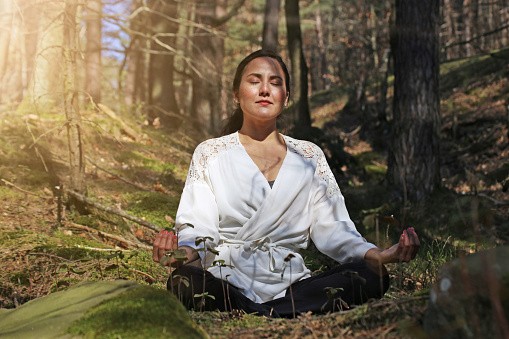I always liked getting outdoors as much as possible, but I didn’t know it was changing or shaping me in any way. I suppose from a young age I was aware that I felt energized when I was playing in the forest. However, it never occurred to me that this time spent in the wilderness might be turning me into a more positive, compassionate, and resilient person. Was nature making me healthier and happier?
My introduction to the health benefits of hanging out in nature came from the book, Your Brain on Nature: The Science of Nature’s Influence on Your Health, Happiness and Vitality. Much has been written about the subject since then and the research is quite compelling.
If nature really is beneficial to our mental health, then there is more to greening our cities than simply reducing heat islands and providing recreation areas. Re-wilding our parks and pathways might help alleviate the stresses of modern life. Nature based climate solutions also include protecting the forests and wetlands that already exist. An old growth forest is worth more standing because of the many ecosystem services that it provides, like biodiversity, water storage, cleaning the air, and carbon sequestration.
But perhaps its most important service to humanity is bringing happiness to all who visit. Arguably it’s happier healthier people that create and support a more inspired and successful green economy.
For many years, Professor John Zelenski, has been focusing his research on nature’s ability to make us happier. In graduate school, his focus was on personality psychology and emotions, which led him to begin studying happiness. He looked at who’s happy and who’s unhappy, while searching for the personality features that influence how people fall into these categories. It was in his early days as a professor at Carleton University that a student expressed her belief that nature was an important contributor to happiness and that if people understood this connection, we might treat nature better as a society.

Carleton University’s Psychology Professor John Zelenski. Credit: Carleton University.
Zelenski was often approached with research ideas, but this particular idea resonated with him. He’d always cared about the environment and nature, but it felt separate from his scientific studies. Fortunately, he acted on this suggestion and it jump-started his studies in this area of psychology. I met with Zelinksy recently, to talk with him about his research on natural relatedness and his views on the connection between nature and happiness.
What did the university think of your new approach to happiness research? Did you have to sell them on the idea?
No, the faculty was really supportive and always gave a lot of flexibility in the particulars of my research. There was still this link to happiness, which was my main area of study, and we keep finding over and over again, how pervasively nature is related to happiness. It does seem to be something that is almost inherent in us and so we look to our evolutionary past to try to explain things like that. We evolved in natural environments and even though they’re different than the kinds of places where we live now, we still have a lot of that evolutionary past, or experience, that influences our mind.
I’ve read about the biophilia hypothesis, which describes our innate attraction to life and living things and I think anyone who is passionate about gardening, loves pets, or spends significant time in nature has felt this attraction. The popularity of camping, hiking, and other outdoor activities has grown despite society’s constant migration to cities. Why do we keep searching for that connection?
We aren’t just attracted to anything related to nature, we are attracted to the healthy areas where we can find a lot of resources that helped us or our ancestors survive. It’s similar to how we evolved to fear things, like snakes and other threats from nature and those phobias stick with us. We’ve evolved to appreciate and seek out the aspects of nature that were beneficial to our survival.
In Japan, the physiological and psychological exercise of “Shinrin-yoku”, or forest bathing, has become very popular. It is believed that spending some meditative time in the forest is a restorative practice that helps with stress, anxiety, and depression. The concept seems to be catching on around the world, including in Canada.
These benefits may be derived from more than just an evolutionary bond with nature. It could also be the improvement in air quality, the chemicals emitted by trees, vitamin D from the sunlight, or sounds. There are some theories that our minds are attuned to the way information presents itself. So, if there’s not enough going on we get bored, but in our contemporary urban environments there may be too much going on, too many people, too many distractions.
Nature is in kind of a sweet spot. You may hear a bird chirping, but if you don’t turn to look at it, you’re not going to get run over by a car. So, in the forest there are enough stimuli to capture our attention, but you don’t have to be so focused that you can’t look away. This natural kind of information flow is thought to be restorative and puts our minds in a good spot. When we are meeting our information needs well, it makes us more reasonable, more rational, nicer people, because we’re not either bored or stressed out.
The Japanese practice of Shinrin-yoku, or forest bathing, is gaining popularity around the globe. Credit: Getty Images.
Tell me about the important findings from your research.
Well, we took the same group of children on two different field trips. One day was a forest school… it’s called a forest school, but basically they just get to play in the woods. It’s pretty unstructured. On another day we took them to the Aviation Museum here in Ottawa. At the end of each day, we gave them questionnaires that included hypothetical scenarios. For example, imagine you were given a gift of $100. What percentage would you keep for yourself, give to charity or spend on presents for other people? The study showed that after time in nature the children shared more with charities and other people. They were more generous after spending time in nature, even though the air museum was a fun and engaging activity as well.
In another task we gave them tanagrams, various shapes that you have to put together, and there were easier ones and harder ones. The student was told that they get to pick a set of shapes for another student to put together. If the puzzle was done correctly then the other student got a prize. After the day in nature, more students gave the easy set of shapes, indicating that they were more willing to help others win a prize.
There are some who were drawn into the whole anti-mask / anti-vax movement and coincidentally they have little desire to spend time in nature. They’re far more interested in shopping and hanging out in bars. Your research made me wonder if there could be a correlation between a lack of affinity for nature and an individualistic attitude during the pandemic?
It’s possible. I mean there’s a lot that goes into it, but you’re putting the pieces together in a way that makes sense to me. It reminds me of another study, where they used the Google Ngram viewer to analyze how often words like “individual” or “self” appeared in literature between 1800 and 2000. The data showed the use of these words steadily increasing while words like “obedience” and “belong” were decreasing. Again, these are broad historical trends, but it seems to indicate that as we urbanize people become more individualistic. There are good aspects to that trend, but maybe we are also becoming less cooperative than we need to be.
I’ve read how people are becoming less happy in spite of having more opportunities, increasing wealth and better health care. Even in Canada, where we’re always highly ranked in terms of best countries to live in, there are studies indicating that we’re collectively become less happy. Can we blame our modern and increasingly digital lifestyles?
I do think there’s something there. I balance that by saying there are wonderful things about modern life. But I believe the notion that we’ve become disconnected from nature and the trend seems to keep growing and growing. You and I are of the age where we can say that when we were kids it was expected of us to go play outdoors and it was fine. Whereas kids today often find that their parents are worried about their safety and they often don’t have these experiences. But there’s a recent study where they discovered that children that grew up with more access to green space had fewer mental health problems later in life.
There’s also this idea in environmental psychology that the effect keeps building. When they looked at how much time in nature people expect to have, they found it keeps diminishing. So maybe some of this social science research will help reverse the trend away from nature, help people remember what we’re missing out on and question the way we construct modern life.
I recently organized a “Bio-Blitz” where people wandered through an urban forest and took pictures of plants and trees using the iNaturalist app. There was a good turn out and everyone seemed to be having fun. In a recent Nature Conservancy article you were quoted as saying, “you wanted to see if getting people to do something nice for nature in turn helps them become happy. Just as helping others usually brings about feelings of happiness and fulfillment, helping nature may boost happiness and produce nature positive attitudes.” I feel like I witnessed this kind of reaction to the Bio-Blitz.
This is wonderful for me to hear because it is early days for the experiments that are going to show this to people who may be skeptical about these positive effects. But I love hearing stories like this that suggest the idea is on the right track anyway.
Most researchers in this area think that getting people out in nature is the best way to help them feel more connected. We found that with just a fifteen-minute walk around Carleton’s campus by the Rideau River, where we give them some mindfulness instruction so they can focus on the present and the things around them, people experience a greater connection with the natural surroundings.
How important do you think it is to try and get more people helping nature?
I think this is huge too, getting that feeling that other people are out there and interested in projects like that. Social psychology has a lot of examples where we often behave in ways that align with strong social norms. If there are a lot of quiet environmentalists, maybe less happens than when people speak up about it. When folks know that this is important to a lot of people, it helps them get on board and believe it. Even if they don’t fully believe it, they see that others are behind it and think, “I should go along with this.”
I feel like these small actions, like planting tiny forests or going for a short walk amongst the trees, will help with some of the anxiety and depression related to the constant feed of negative information, like pandemics, war, and climate change.
There are some exciting studies that are coming up in this area, as well as lots of anecdotes like what you’re describing, where it gets overwhelming to think about things like climate change, but doing something about it and being in nature will help things seem a little bit better.

Rob Miller is a retired systems engineer who now volunteers with the Calgary Climate Hub and writes on behalf of Eco-Elders for Climate Action. As a climate activist, he works to stop old-growth logging in British Columbia, to reject coal mining on Alberta’s eastern slopes, to facilitate community involvement in urban afforestation, and to advocate for renewable energy. Miller uses a “systems-thinking” approach to learn, understand, and defend the ecosystems that are under threat by climate change and unrestrained resource development.
Featured image: The Rideau Canal in Ottawa. Credit: City of Ottawa.










